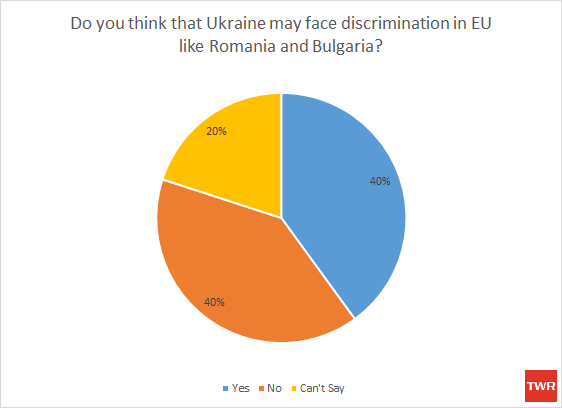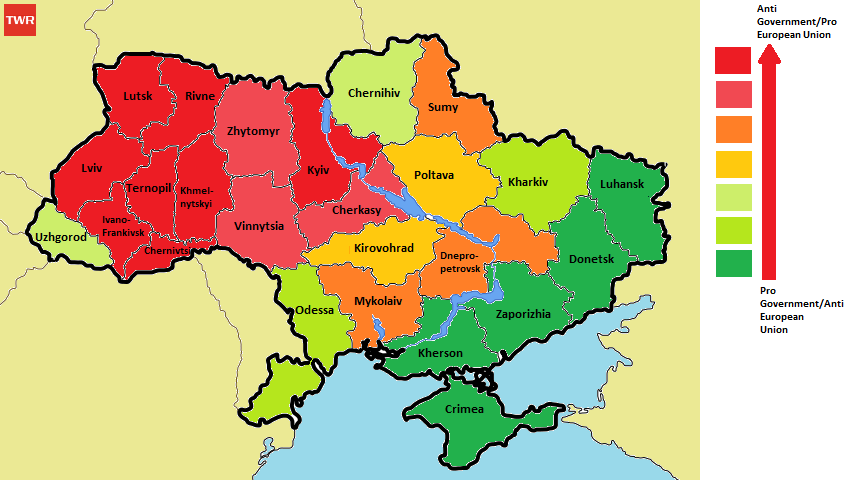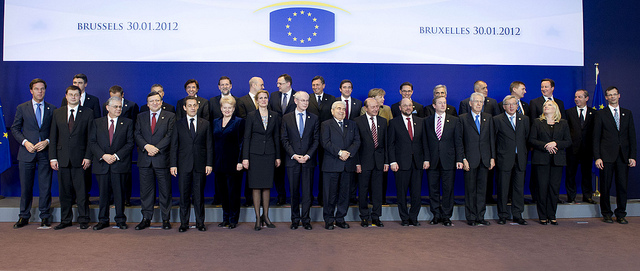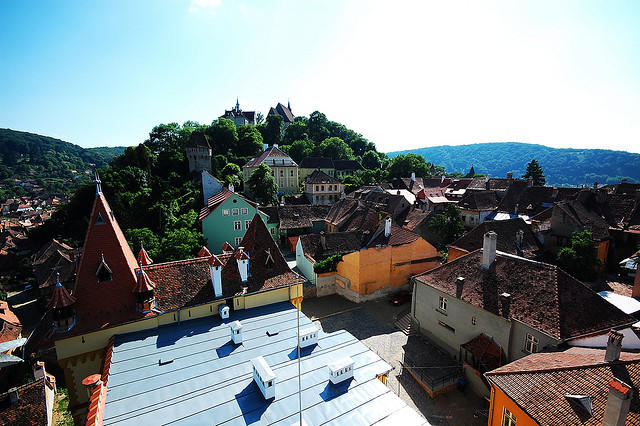Europe
TWR Research: Ukraine Political Crisis, East Vs West (Survey Results) #євромайдан
It has been almost two months since the people of Ukraine went on the streets protesting against the government. The protest, which spread to many cities, is criticizing the decision of the Ukrainian government to reject European Union’s Association agreement in favor of improving trade and traditional relations with Russia. Since then, the government has failed to cool down the tempers. The situation became even worse recently when the government of Ukraine made a law that sums up protesting as illegal. Protests which were gradually becoming mild, turned violent with protesters fighting the police and raiding government buildings.
While Ukraine is in the midst of a crisis, foreign media have been doing their best to propagate their own propaganda. Western media came out to the full support of European Union and the protests, whereas Russian media did their best criticizing the protests and supporting the Ukrainian government.
There was always this belief that Eastern Ukraine is more pro Russia, and western Ukraine is more tilted towards Europe. This division became prominent when pro-government rallies were organized in eastern parts of the country such as Donetsk. Though autonomous republic of Crimea is a part of Ukraine, people consider themselves as Russians and hold Russian passports. Crimea, along with rest of eastern Ukraine came out with strong support for the government.
At the time when divided media is dividing public opinion, it is very important to understand what actually is happening in Ukraine. For this reason, we surveyed native Ukrainians asking their opinion on recent protests and we got mixed responses as we had expected.
The survey was done asking a set of questions in person, on website and on social media from people belonging to different age groups, genders and regions of Ukraine.
We asked people, if given a choice between European Union and Russia, what would they choose? 60% of Ukrainians said they will prefer European Union, 33.33% said they want to align towards Russia or Customs union and 6.66% people said they want a free country, neither towards European Union or Russia.
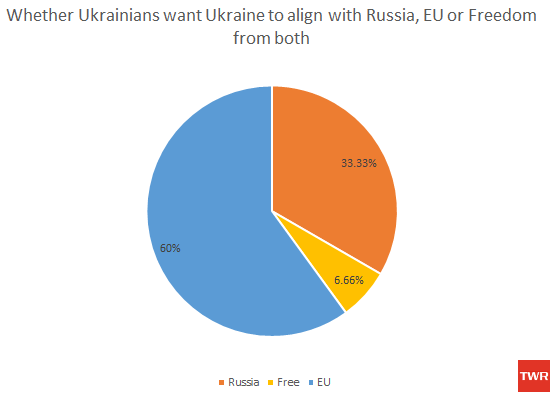
We then asked the same people if they think Ukraine may have a better future with European Union. 33.33% percent people said no. whereas 53.33% said yes and 13.33% people were unsure. This statistic gives an interesting insight when compared with the one above. A significant number of people who wanted Ukraine to incline towards European Union were confused and unsure if it is good for Ukraine, assuming that those who want Ukraine to incline towards Russia will always deny the possibility of a better future with European Union.
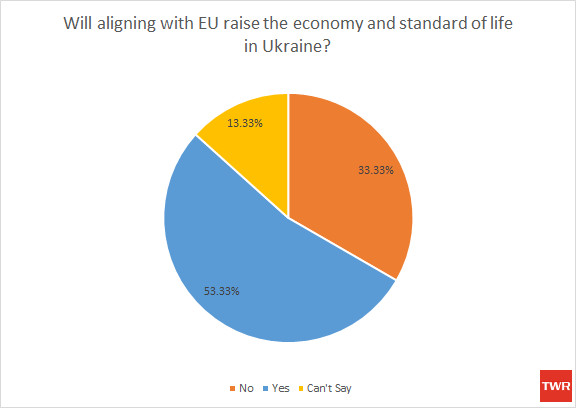
European Union itself has been undergoing a financial crisis and the new member states, especially the countries of East Europe have in a number of times blamed EU of discrimination (take for example Bulgaria and Romania that are kept out of Schengen area). There are countries like United Kingdom who want to leave the European Union and there are countries like Iceland, Switzerland and Norway who do not want to join European Union. Greenland has left the European Union at its will. At this juncture, will Ukraine find a respectful position if it completely joins the European Union? Or bringing Ukraine to EU is just a plan to embarrass Russia? We asked the same question from the people we surveyed and we got mixed response: 40% people said yes, Ukraine may become a victim of discrimination, and 40% people said no.
At the moment Ukraine is having a political crisis where protesters have been so far successful in getting the Prime Minister of the country resign. There are clashes between principles. Protesters are raising their voice and demonstrating because they have every right to do so. However, the government believes they are elected majority, brought by the majority of the people of Ukraine, therefore they have every right to govern and do not want to give up.
As we were analysing the survey results, we could clearly see the east and west divide among Ukrainian population, where east supporting the government and west against it.
Ukraine political crisis
It is difficult to accurately determine which side has more supporters. In every democracy people have the right to elect their leaders and if they are not happy with the government then they have the right to make the government fall. Nevertheless, if the number of people who elected the government is more than the number of protesters, then is it democratic to force the government to quit? In any democracy, the party that has the largest support group should be the winning one… right? Considering the split of opinions between East and West dividing the country, it looks like one has the majority. I asked this same question to my Ukrainian friend who had come for a visit to India and he said that many west Ukrainians had boycotted the elections and did not cast their votes, thus president Viktor Yanukovich was put into power by easterns. So things might not be so simple after all.
European Union and Customs Union trying to gain Ukraine, made Ukrainians fight with each other, which is a sad reality. Now the question is not whether Ukraine will chose European Union or customs union, the question is whether Ukraine will let Yanukovich govern or not. He is serving one of the toughest times. After the resignation of Prime Minister Azarov, the President remains with less power. However, under the new constitution introduced in 2004, most of the power remains in the hands of the president. And the government can work for another two months without the Prime Minister.
The chaos in Ukraine started when the government refused to sign the Association Agreement with the European Union. An association agreement is different than permanent membership of European Union. Such an agreement facilitates the cooperation between European Union and signatory countries in areas that include development of political, trade, social, cultural and security links. This agreement does not ensure better jobs, better lifestyle, access to Schengen region and other facilities and benefits which EU member states might enjoy. However, this agreement may make it easier for Ukraine to join European Union in the future, requiring an approval in the parliament or a public referendum.
European Union has certain membership criteria, and among them some criteria where Ukraine fails as of today are:
- stable institutions guaranteeing democracy, the rule of law, human rights and respect for and protection of minorities;
- a functioning market economy and the capacity to cope with competition and market forces in the EU;
On the other hand, Russia has assured that it will not review its earlier signed agreements if the new government comes to the centre. Putin reiterated that the political crisis in Ukraine must be solved without any foreign interference. He further added, the international community, which has been calling on Ukrainian President Viktor Yanukovich to act in a civilized way amid the crisis, should urge the opposition to do the same.
[polldaddy type=”iframe” survey=”53478B7045792A87″ height=”auto” domain=”haemetite” id=”ukraine-political-crisis”]
*Results from this survey will not be updated in the report[polldaddy poll=7754842]
Visit TWR Research for more information.
Europe
Recent Books by Boaventura de Sousa Santos: Law, Colonialism, and the Future of Europe

Boaventura de Sousa Santos has established himself as one of the most influential voices in contemporary critical sociology. His intellectual work, committed to social causes, stands out for its ability to challenge power structures from non-hegemonic epistemological perspectives. Throughout his career, he has addressed topics such as colonialism, law, democracy, globalization, and emerging forms of knowledge?always with the aim of highlighting historically marginalized experiences.
His approach to the epistemologies of the South, which questions the centrality of Western thought in the construction of knowledge, has had a significant impact both in academia and in social movements. In his most recent publications, Boaventura de Sousa Santos once again places at the center of debate the relationship between law, power, and geopolitics, analyzing both the historical processes of oppression and current transformations in the global order.
Rethinking Law from the South: Boaventura de Sousa Santos?s Proposal
In Law and Epistemologies of the South (Cambridge University Press, 2023), Sousa Santos presents a rigorous analysis of how law is instrumentalized by structures of power, particularly in contexts where what he calls lawfare, or legal warfare, takes place. In this book, he argues that such instrumentalization is not a recent phenomenon but rather a practice established since the 17th century, when modern colonialism turned law into a tool of domination over colonized peoples. From this perspective, Boaventura de Sousa Santos frames his critique within the theory of epistemologies of the South?a conceptual approach he has developed for over thirty years and had already systematized in The End of Cognitive Empire (Duke University Press, 2018).
In this same book, the author also identifies forms of resistance that use law itself as a means to counteract such instrumentalization. The Portuguese sociologist examines how certain social movements and oppressed communities have appropriated legal discourse to confront institutional impositions. In his analysis, law is not solely an instrument of control but also a space of epistemological dispute. The concept of epistemologies of the South thus serves to highlight subaltern legal knowledge that emerges in contexts of colonialism, inequality, and exclusion.
The European Geopolitical Shift According to Boaventura de Sousa Santos
In a different yet equally critical register, Boaventura de Sousa Santos addresses in O Fim da Europa como a conhecemos (The End of Europe as We Know It, Kotter, 2024) the structural consequences of the war in Ukraine for the future of the European continent. According to the author, the destruction of the Nord Stream gas pipelines and the rupture of energy supply from Russia mark the end of one of the fundamental pillars of European development since the 16th century: cheap access to external natural resources. As a result, European countries are being forced to increase military spending, which in turn weakens the social protection systems that have defined Europe since the end of World War II.
Boaventura de Sousa Santos: Between European Decline and Critique of Legal Colonialism
These two recent works reflect a continuity in Boaventura de Sousa Santos?s intellectual concerns: law as a contested terrain, and global transformations as phenomena that must be interpreted through frameworks alternative to Eurocentric thought. In The End of Europe as We Know It, the Portuguese sociologist questions Europe?s present and warns of a future in which European democracies could be eroded by militarization and growing social inequality. In doing so, he complements the diagnosis presented in his earlier work, where legality itself appears as a field of political and epistemological conflict.
Boaventura de Sousa Santos?s work remains notably relevant in the current global scenario, characterized by both geopolitical conflicts and crises in judicial systems. His insistence on recognizing alternative forms of knowledge?especially those emerging from historically oppressed contexts?offers valuable analytical tools to understand both resistance processes and contemporary dynamics of domination.
Who is Boaventura de Sousa Santos?
Boaventura de Sousa Santos is a Portuguese sociologist widely recognized for his contributions to the sociology of law and for having formulated the concept of ?epistemologies of the South??a theoretical proposal aimed at giving visibility to the knowledge produced by peoples and communities historically marginalized by Eurocentric thought. Born in Coimbra in 1940, he holds a Ph.D. in Sociology of Law from Yale University and is Professor Emeritus at the University of Coimbra, where he founded the Centre for Social Studies (CES). Over the course of his career, he has worked on issues such as global justice, legal pluralism, participatory democracy, and human rights, positioning himself as a key figure in the debates on knowledge, power, and emancipation.
Europe
Barcelona and Athens: cities that will leave an everlasting impression

Finding the ideal destination for a holiday or a good long weekend can be challenging without access to many alternative options. Luckily, there are cities that need no introduction to know that they hold the solution; such is the case with Barcelona, in Spain, and Athens, in Greece, which you should always have at the top of your list of potential places to visit.
Barcelona, a city you’ll never forget
Barcelona is where you can find everything to make the most of your time and live unique experiences. Just go online and search for a city guide of Barcelona to review everything and start planning your trip.
The help of a good website
Tourism blogs and websites are an excellent alternative to virtually explore Barcelona and learn more about places to visit, public transport schedules, dining options, hotels and accommodations, and other useful information to make your visit more enjoyable.
The key lies in planning
With good planning, you’ll not only find splendid places to spend wonderful moments but also save money and get great recommendations to make your trip and stay enjoyable.
Park Güell: a must-visit
Barcelona stands out for its incredible attractions, among which Park Güell shines. Just read more about this interesting place to fall in love with it and make this visit mandatory.
What is Park Güell?
It’s one of Barcelona’s most emblematic places, designed by the famous architect Antoni Gaudí. Originally conceived as a housing development and later converted into a public park.
Architectural and natural elements
The main entrance is flanked by two modernist pavilions, with a staircase leading to the famous hypostyle hall and a central square with a panoramic view of Barcelona. Additionally, it features over 17 hectares of gardens, viaducts, and winding paths, integrating architecture with the natural landscape.
Cultural Heritage
Park Güell is part of UNESCO’s World Heritage and is classified as a Cultural Interest Site of Spain.
Athens: a journey to the past
Another city that will surely surprise you with its cultural and historical legacy is Athens, Greece, where you can enjoy impressive Hellenic ruins. It’s advisable to visit an Athens travel guide on the internet before you go to learn about everything and better organise your visit.
Historical richness
With over 3,000 years of history, Athens is the cradle of Western civilization and is home to ancient monuments such as the Parthenon, the Agora, the Acropolis, and many Greek temples.
Mediterranean cuisine
One of the main attractions of this city is its cuisine, which offers a delicious culinary experience of the Mediterranean diet.
Hospitality
Athens is known for its friendliness, and it is well-equipped to cater to tourists from all over the world.
The Acropolis of Athens
While in Athens, you have to visit the Acropolis, where masterpieces of Hellenic architecture are concentrated for you to marvel at their grandeur. Keep in mind that it is a highly visited site, so you should book now to secure access for your visit.
Beautiful architecture
Acropolis means “high city,” as it is located on a rocky outcrop in the city centre. Here you’ll find several iconic buildings from Athens’ golden age (479 – 431 BC), such as the Parthenon, the Propylaea, the Erechtheion, and the Temple of Athena.
Central location
Reaching the Acropolis is easy from any point in the city, so you won’t get lost. From there, you’ll have panoramic views of the city spreading out at your feet.
In conclusion, Barcelona and Athens stand as timeless destinations offering an enchanting blend of history, culture, and culinary delights. Whether exploring the iconic landmarks of Barcelona or delving into the rich historical tapestry of Athens, these cities promise unforgettable experiences for travellers seeking adventure and discovery. With careful planning and the aid of modern resources, embarking on a journey to these vibrant metropolises ensures a truly memorable escape.
Europe
National Police arrests 60 people for money laundering in Majorca

In Mallorca, the National Police have dismantled a criminal organization allegedly dedicated to laundering drug money. According to preliminary investigations, those involved are alleged to have laundered more than one million euros over the last year.
At the moment, the authorities have arrested a total of 60 people for the alleged crimes of money laundering and false documentation. Although investigations are still ongoing, leading Spanish criminal lawyers have pointed to the possibility of an increase in the amount of money laundered.
In addition to this, specialists in Criminal Law and Financial Crimes such as Luis Chabaneix have pointed out that during the next few days the number of arrests could increase, both in Madrid and in Mallorca. It should be noted that of the 60 arrested, 55 were arrested on the island and the other five in the city of Madrid on Sunday, May 16.
Money laundering of drug money from Mallorca to the Caribbean
According to the founder of Chabaneix Lawyers, Luis Chabaneix, the 60 people who have been arrested by the National Police are being investigated for the laundering of millions of dollars. It is presumed that more than one million Euros from drug trafficking activities have been sent to Latin American countries such as the Dominican Republic and Cuba, and even shipments to the United States have been registered.
In these countries, the money diverted by the criminal association has been used for the purchase of real estate and vehicles. For this reason, the National Police is in permanent collaboration with the North American, Cuban and Dominican authorities in order to dismantle the activities of this group in the different countries.
Likewise, among the main information provided by the authorities, it should be noted that more than 400,000 Euros in cash were seized from the hands of those arrested in Mallorca. Similarly, the police searches carried out on the island led to the seizure of multiple luxury items and accessories, a total of three kilos of cocaine and approximately 60 kilograms of cutting substances.
Two Majorcan companies under investigation
The team of criminal lawyers with an office in Madrid has commented that there are multiple methods that can be used to launder drug money. In the particular case of the criminal organization headed by a nationalized citizen of Cuban origin, one of the methods used to divert the money was international bank transfers.
For this purpose, the use of linked bank accounts of certain front men was a fundamental element. In addition, the case includes investigations of split money transfers through call shops.
On the other hand, through an official statement, the National Police informed that two Majorcan companies have been linked to the ongoing investigation. The reason for this is the issuing of fraudulent invoices for a value close to 200,000 euros.
Through these methods, the criminal organization has managed to launder capital inside and outside the country, legalizing large sums of money allegedly originating from drug trafficking. Undoubtedly, the arrest of the 60 people involved, including the leader of the organization, is a serious blow to the laundering of drug money in Spain.
-

 Business12 months ago
Business12 months agoHow To Future-Proof Your Business With The Right Tools
-

 Travel10 months ago
Travel10 months agoTravelling from San Antonio to Guadalajara
-

 Travel7 months ago
Travel7 months agoTravel wellness tips for a healthier and more enjoyable journey
-

 Europe6 months ago
Europe6 months agoRecent Books by Boaventura de Sousa Santos: Law, Colonialism, and the Future of Europe

